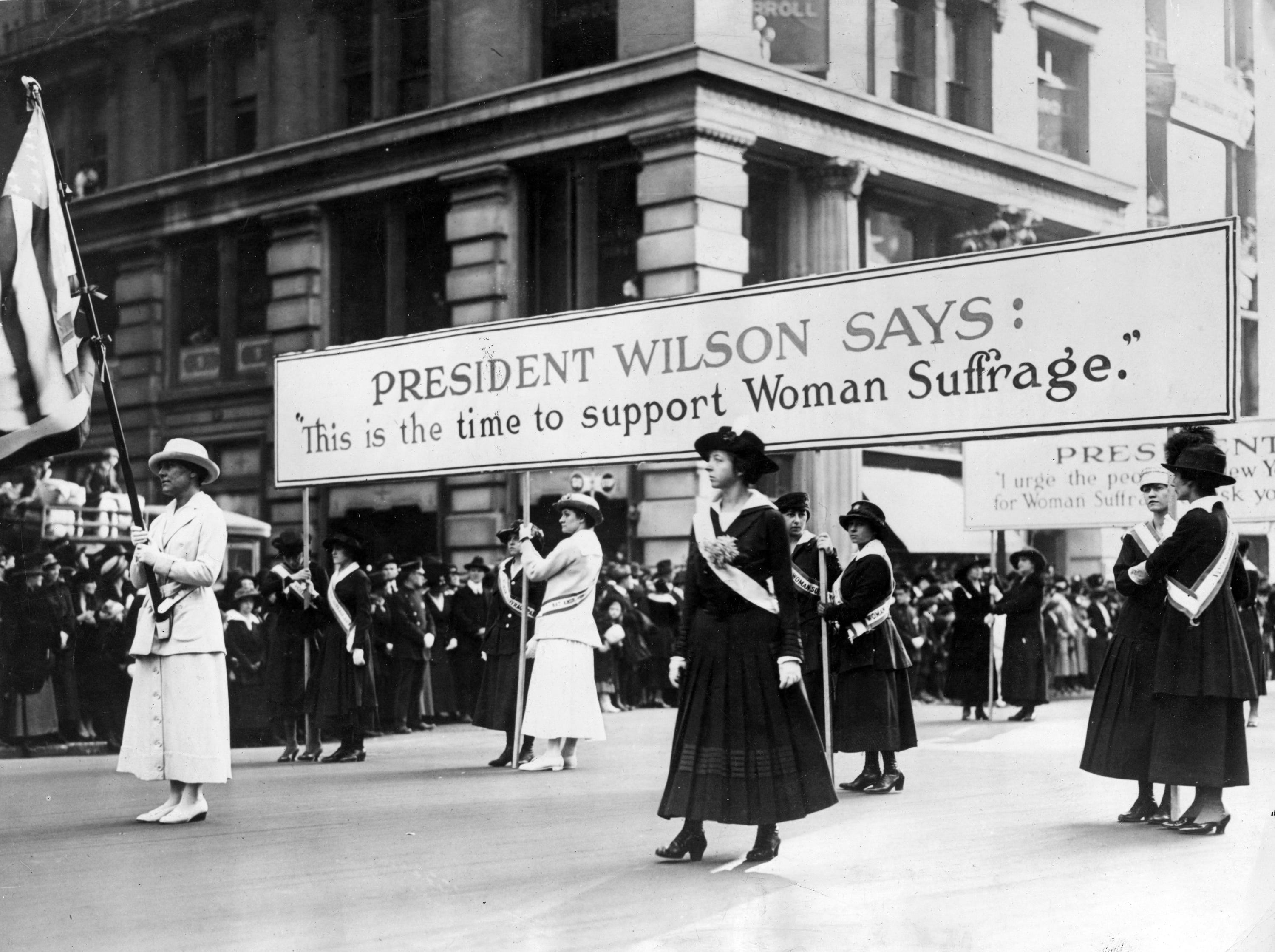

Legal News for Tues 9/30 - Trump Abandons War on Drugs, Deploys Troops to Portland Oregon, and Implications of Anker’s Tariff Investigation
This Day in Legal History: Woodrow Wilson Supports Women’s Suffrage
On September 30, 1918, President Woodrow Wilson took the unprecedented step of addressing the U.S. Senate directly to urge passage of a constitutional amendment guaranteeing women the right to vote. The House of Representatives had already approved the amendment earlier that year, but the measure had stalled in the Senate. Wilson’s speech came during the final months of World War I, a context he used strategically—arguing that women had proven their patriotism and value to the nation through their labor, sacrifice, and civic contributions during wartime.
Framing suffrage as a war measure and an issue of national unity, Wilson stated that denying women the vote was an injustice that undermined American democratic ideals. He contended that the world was watching and that the U.S. could not claim to fight for democracy abroad while denying it to half its citizens at home. The speech was notable both for its timing and for the fact that it came from a president who had previously been lukewarm on the issue.
Wilson’s appeal was a calculated political move, reflecting both the growing power of the women’s suffrage movement and the need to maintain national morale. Though his speech failed to immediately sway enough senators—the amendment would not pass the Senate until June 1919—it marked a pivotal shift in executive support. Wilson’s endorsement helped legitimize the movement and apply pressure on reluctant lawmakers.
The Nineteenth Amendment, which prohibited the denial of the right to vote on the basis of sex, was finally ratified in August 1920. Wilson’s 1918 address thus stands as a key moment in the long legal and political battle for women’s suffrage in the United States, symbolizing the growing alignment of public sentiment, executive advocacy, and legislative momentum that would eventually culminate in constitutional change.
In an exclusive from Reuters, federal drug prosecutions in the United States have dropped to their lowest level in decades, as the Trump administration shifts law enforcement priorities toward immigration enforcement. A Reuters analysis of nearly 2 million federal court records reveals that prosecutions for drug offenses are down 10% from the same period in 2024, with money laundering charges—often linked to high-level traffickers—dropping by 24%. These declines mark the slowest rate of federal drug enforcement activity since at least the late 1990s.
The shift stems from President Trump’s directive shortly after taking office to reallocate thousands of federal agents toward immigration-related efforts, including assisting U.S. Immigration and Customs Enforcement (ICE) in daily raids. This redirection of resources has disrupted traditional drug enforcement operations, with agents reporting that long-term investigations have stalled and critical cases are going “stagnant.” Even fentanyl-related investigations have been sidelined due to agents being pulled into immigration duties.
Despite promises of a tough-on-drugs approach—including calls for the death penalty for some dealers—the administration’s actions have hollowed out the Justice Department’s Organized Crime Drug Enforcement Task Force and rerouted DEA and ATF agents to support deportation operations. These agents, often unfamiliar with immigration law, are now tasked with support roles such as transportation and crowd control during raids, sometimes simply for the sake of producing social media-friendly imagery.
Meanwhile, prosecutions tied to drug importation and conspiracies have declined 6% and 15%, respectively, and gun charges associated with drug crimes have also fallen. Officials warn that the impact of this reprioritization could deepen over time, as investigations delayed today will not yield prosecutions for months or years. Nearly half of all federal criminal charges this year involve immigration violations, and over 700 federal prosecutors have been reassigned to immigration matters.
While the White House defends the shift as a successful effort to reduce the flow of drugs by targeting violent criminals and cartels, law enforcement officials describe a chaotic, politically driven enforcement regime that sacrifices complex criminal investigations for visible, short-term wins. The resulting system raises concerns not only about public safety but about the long-term effectiveness of federal law enforcement priorities.
Exclusive: Federal drug prosecutions fall to lowest level in decades as Trump shifts focus to deportations | Reuters
The Pentagon has deployed 200 Oregon National Guard troops under federal authority after President Donald Trump announced plans to send military forces into Portland, Oregon. The move, aimed at protecting federal immigration facilities from what Trump called “domestic terrorists,” immediately triggered a legal challenge from the state. Oregon Attorney General Dan Rayfield filed a federal lawsuit against Trump, Defense Secretary Pete Hegseth, and Homeland Security Secretary Kristi Noem, arguing that the federal deployment infringes on the state’s sovereign authority over its own law enforcement and National Guard.
The lawsuit describes Trump’s justification as exaggerated and unsupported, noting that protests against ICE in Portland have remained relatively small and peaceful since June. It also highlights a sharp decline in violent crime in the city—homicides are reportedly down 51% compared to the same time last year—raising further questions about the necessity of military intervention.
The deployment order took even top Pentagon officials by surprise, with several describing it as a “bolt from the blue.” Defense Secretary Hegseth’s memo authorizing the deployment was later attached as evidence in Oregon’s lawsuit. Portland officials, including Mayor Keith Wilson, were not informed of the plan in advance and reportedly learned about it via social media.
Trump’s rhetoric about using “full force” remains ambiguous, with no clarification on whether that includes authorization of lethal force or under what conditions it could be used. Historically, U.S. troops deployed domestically are only permitted to use force in self-defense. The sudden move has heightened tensions, particularly following a recent shooting at an ICE facility in Dallas that left one detainee dead and two others injured. Critics argue the administration’s increasingly aggressive immigration enforcement risks politicizing the military and provoking unnecessary conflict in U.S. cities.
Pentagon calls up 200 National Guard troops after Trump Portland announcement | Reuters
In my column for Bloomberg this week, I explore a recent tariff investigation. The investigation into computer peripheral manufacturer Anker Innovations’ alleged tariff evasion highlights how modern tariff enforcement has evolved into a sprawling, bureaucratic effort that diverts taxpayer resources toward compliance rather than bolstering domestic industry. Rather than serving as effective tools of economic nationalism, tariffs often end up creating work for customs officials, trade lawyers, and compliance consultants. Each adjustment to tariff classifications triggers complex administrative networks that contradict the ideal of limited government.
This system’s irony deepens when considering that agencies like the IRS are underfunded, even as policymakers lean more on tariffs—a less efficient and more easily manipulated revenue source. The result is a compliance-heavy environment that benefits well-resourced firms while leaving smaller importers at a disadvantage. Investigating potential violations can be costly and time-consuming, encouraging selective enforcement and fostering a procedural limbo where discretion and inefficiency thrive.
The current approach, which places tariff power largely in the executive branch, introduces volatility and undermines predictability in trade policy. Companies may invest heavily in litigation over classification issues, only to see the rules change mid-process. This undermines confidence in the system and raises the risk of corruption and favoritism. I argue that returning tariff authority to Congress and reinvigorating corporate tax enforcement would make the system more equitable and effective.
This is a public episode. If you'd like to discuss this with other subscribers or get access to bonus episodes, visit www.minimumcomp.com/subscribe
More Episodes
All Episodes>>Create Your Podcast In Minutes
- Full-featured podcast site
- Unlimited storage and bandwidth
- Comprehensive podcast stats
- Distribute to Apple Podcasts, Spotify, and more
- Make money with your podcast












